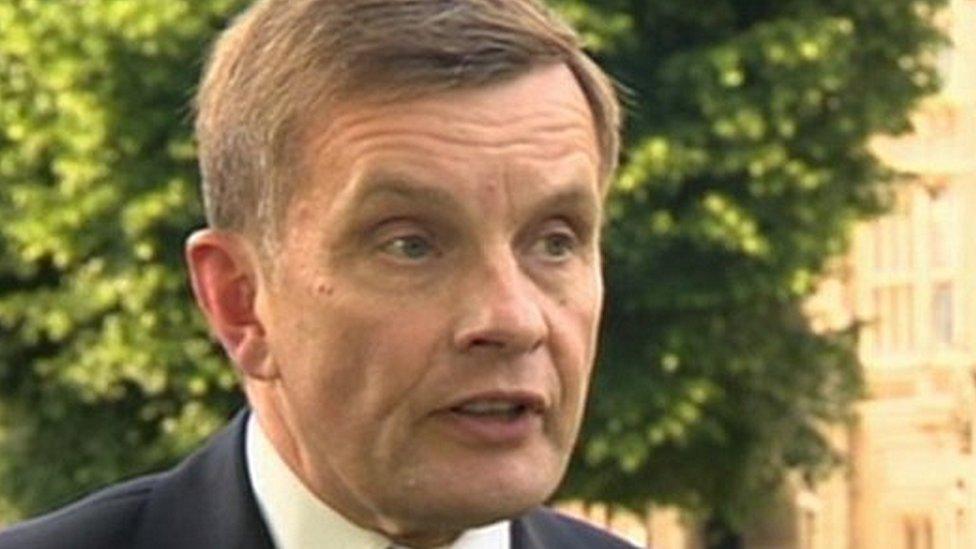Welsh ministers face 3% cut in years ahead, warns IFS
- Published
David Phillips of the Institute for Fiscal Studies said ministers face difficult choices
Welsh ministers face a budget cut of 3.2% in real terms over the next three years, a think tank has warned.
The Institute for Fiscal Studies (IFS) said the cuts would double if EU aid was not replaced after Brexit, with councils likely to be hit hardest.
The IFS said using proposed new powers to raise income tax in Wales by 1p in the £1 would plug half the gap.
UK ministers want some control of income tax devolved to Welsh ministers but no date has been set for this.
The Welsh Government's annual budget is about £15bn but it has complained that cuts at a UK level have left it with less to spend.
The IFS said the real-terms cut of 3.2% identified would be worth around £445m and would represent a decrease in revenue spending, which makes up the vast majority of the budget.
It means that after inflation, the Welsh government would have 3.2% less for day-to-day spending in 2020 than it does now.
According to the IFS report, a decision not to cut NHS spending would mean other departments facing cuts of 7.4%.
On European funding, the report said that while the UK government had guaranteed some projects would be funded until 2020, it was "even less clear what funding will be available for schemes currently funded by the EU after 2020".
It added: "If no additional funding was provided, the Welsh Government would have to find over £500m a year from its existing budget if it wanted to continue to fund these schemes.
"This could more than double average budget cuts to 6.9% in 2020-21 (assuming the remainder of the Welsh Government's funding was unchanged)."

Protecting NHS spending could mean substantial cuts in other areas, such as local government, the IFS says
Polly Simpson, a research economist at the IFS and an author of the report, said: "This research highlights the difficult budgetary trade-offs facing the Welsh Government.
"Protecting such large areas of spending as health, social care and education would require substantial cuts to other areas of spending that have often already had to absorb seven years of real-terms cuts.
"It is also important to realise that increases in the taxes under Welsh Government or councils' control is unlikely to be a panacea.
"For instance, even increasing council tax by over 7% a year, could still leave some council services facing double-digit cuts over the next three years."
A Welsh Government spokeswoman responded: "This report shows that the Welsh Government's budget will be 11.6% lower by 2019-20 compared to 2010-11 as a result of the UK Government's ongoing cuts to public finances and programme of austerity.
"We are currently developing our budget for 2017-18, which will be published on 18 October, and are looking at the long-term outlook and how the pressures identified by the IFS can be managed."
On concerns over EU aid post-Brexit, the spokeswoman added: "The first minister has made clear that he expects the UK Government to make good on the promise made to the people of Wales that we will not lose a penny in European funding."
A Treasury spokesman said capital budgets available to the Welsh Government for infrastructure investment will rise by more than £900m through to 2020-21.
He added: "Welsh Government budgets for day-to-day spending are reducing by an average of 0.8% per year in real terms over the Spending Review period, reflecting the application of the Barnett formula to decisions we took to continue to repair the public finances whilst protecting NHS and schools funding in England.
"How it allocates the funding available to it in its forthcoming budgets is, as the IFS note, a matter for the Welsh Government."
- Published13 September 2016

- Published12 September 2016

- Published26 July 2016

- Published14 June 2016

- Published25 November 2015

- Published17 December 2014
